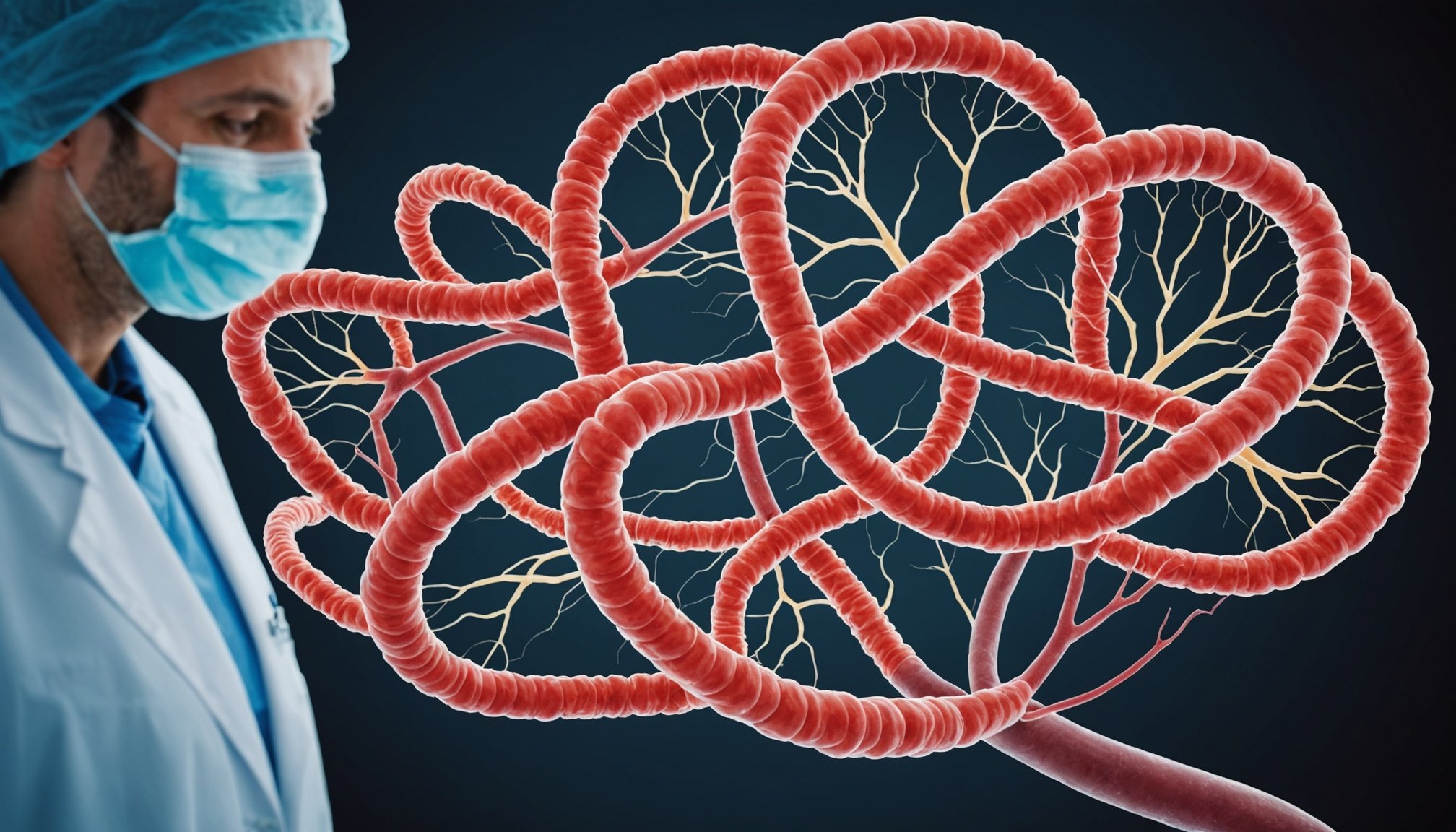Overview of Fecal Transplantation for Recurrent C. Difficile Infections
Fecal transplantation offers a novel approach for treating recurrent C. difficile infections. Historically, this method traces back to the 4th century, with contemporary medicine recognising its potential in the 1950s. Only in the past decade has it gained widespread acceptance due to the increasingly resistant nature of C. difficile and traditional antibiotic therapies.
The mechanism behind fecal transplantation involves introducing stool from a healthy donor into the patient’s gut. This process aims to restore the natural balance of gut microbiota, which is often disrupted in patients with recurrent C. difficile. By re-establishing a diverse microbial environment, fecal transplantation can effectively suppress the overgrowth of C. difficile, thereby diminishing infection symptoms and reducing recurrence.
Also read : Unlocking Targeted Cancer Treatments: The Role of Precision Medicine in UK Oncology
Currently, fecal transplantation is reflected as a highly effective treatment within the toolbox of clinicians managing C. difficile infections. It is predominantly recommended for cases where antibiotic treatments fail or for patients experiencing multiple recurrences. Advanced procedures like colonoscopic infusions or enema are employed to ensure the safe delivery of the transplant, offering renewed hope for patients plagued by chronic gut distress. Advances in encapsulated fecal microbiota derivatives are beginning to simplify delivery methods further, making this therapy increasingly accessible and acceptable.
Clinical Guidelines for Implementation
Clinical guidelines are essential for ensuring fecal microbiota transplant protocols are both safe and effective. These protocols have been developed to standardise procedures across various healthcare facilities, focusing on patient safety, donor selection, and microbiota preparation.
In the same genre : Enhancing Patient Quality of Life: Strategies for UK Hepatologists in Managing Cirrhosis Complications
In the UK, prominent organisations such as the National Institute for Health and Care Excellence (NICE) and the British Society of Gastroenterology have put forth specific implementation guidelines. These guidelines provide comprehensive recommendations on patient eligibility, donor screening, and administration methods.
To maintain consistency in treatments, the recommended clinical protocols highlight the importance of stringent donor screening processes. This includes comprehensive medical history assessments and laboratory testing to minimise the risk of transferring infections. Additionally, thorough microbiota preparation methods are advised to preserve the viability of beneficial microbes.
Evidence-based practices form the cornerstone of these implementation guidelines. Recent studies have corroborated the efficacy of fecal transplantation in treating recurrent Clostridium difficile infections. The guidelines encourage ongoing research and adaptation of protocols based on emerging evidence to optimise patient outcomes.
Overall, these clinical and implementation guidelines ensure that fecal microbiota transplants are conducted with the highest standards of safety and scientific rigor, providing reassurance to both clinicians and patients.
Patient Selection Criteria
When considering fecal microbiota transplant (FMT), determining the right patient selection criteria is crucial. Identifying suitable candidates involves thorough assessment of their medical histories and specific needs. The primary eligibility criteria include patients suffering from recurrent Clostridium difficile infections (CDI), particularly those not responsive to conventional treatments.
Identifying Appropriate Candidates
For fecal transplantation, typically, individuals who have experienced multiple episodes of CDI despite receiving antibiotic therapy are considered. This recurrent pattern suggests that restoring a balanced gut microbiome could provide significant benefits.
Risks and Contraindications in Patient Selection
Not all patients are ideal for FMT. Contraindications might include underlying health conditions or compromised immune systems, which could increase the risk of adverse effects. Careful evaluation helps avoid complications and ensures patient safety.
Role of Patient History and C. difficile Recurrence Patterns
Patient history plays a vital role in the selection process. Reviewing the frequency and severity of CDI episodes helps in understanding the patient’s suitability for FMT. Those with a history of repeated infections after antibiotic treatment are prioritized, as they are more likely to benefit from microbiota restoration.
By adhering to strict eligibility criteria and considering individual patient histories, healthcare providers can ensure effective and safe outcomes for those undergoing fecal microbiota transplant.
Procedure and Techniques
Embarking on a fecal transplant procedure requires a meticulous approach, given its potential to transform patient health. Initially, it’s essential to select an appropriate donor, which involves rigorous screening to eliminate pathogen-related risks and ensure gut flora compatibility. Once a donor is approved, the stool undergoes careful preparation techniques to create a safe and effective transplant solution.
The actual procedure of fecal transplantation is often conducted through a colonoscope. This administration method allows doctors to deliver the stool directly to the colon, ensuring optimal integration. Alternatively, less invasive techniques such as enemas are sometimes employed. While they can be more convenient, the efficiency might vary compared to colonoscopy, requiring precise technique to guarantee uniform distribution.
When considering these options, factors like patient comfort, procedure complexity, and potential side effects play pivotal roles. Additionally, the choice between methods depends largely on the individual’s health status and the specific condition being treated.
The diverse range of procedural techniques underscores the importance of personalising the administration method to best meet patient needs. A thorough understanding of these steps helps medical professionals design effective, tailored treatments, maximising the potential benefits of fecal transplants.
Outcomes and Efficacy
Understanding the treatment outcomes and efficacy of fecal transplantation is crucial for evaluating its potential benefits. Studies have shown promising success rates, often outperforming traditional treatments, particularly for recurrent Clostridium difficile infections. The efficacy of fecal transplantation in these cases is generally high, with success rates of around 85-90%. Such impressive results position this approach as a viable alternative when conventional methods fall short.
Comparative studies with other treatments reveal that fecal transplantation not only provides immediate relief but also plays a significant role in preventing recurrence. While antibiotic treatments may initially suppress the infection, they do not guarantee lasting results. On the contrary, fecal transplantation aids in restoring the gut’s natural microbiota, thus promoting a more permanent recovery solution.
In terms of long-term outcomes, regular follow-up protocols are essential to ensure sustained success. Monitoring patient progress through clinical assessments and microbiome analyses helps identify potential complications early on. Additionally, many patients report significant quality of life improvements post-transplant, highlighting its effectiveness beyond mere symptom relief. Enhanced well-being, better understanding of gut health, and reduced anxiety about recurrences are notable benefits experienced by recipients.
Regulatory and Ethical Considerations
The regulatory framework governing fecal microbiota transplantation (FMT) in the UK is both comprehensive and continuously evolving, ensuring that the procedure meets high safety and ethical standards. Oversight by the Medicines and Healthcare products Regulatory Agency (MHRA) is crucial in providing guidelines that clinics must follow. These regulations cover the entire process, from donor screening to transplant procedures, safeguarding patient health and procedural efficacy.
Ethical guidelines are central to FMT practices, focusing heavily on informed consent. Patients must be fully aware of the potential risks and benefits involved. This ensures that they make educated decisions about undergoing the procedure. Beyond consent, ethical considerations also address issues of privacy and the confidentiality of donor and recipient information.
FMT’s growing use in clinical treatments underscores the importance of research compliance. UK-based clinical trials adhere strictly to both national and international standards, ensuring scientific integrity and patient safety. Trials are subject to rigorous review processes that scrutinize methodologies and anticipated outcomes. Adhering to these regulations not only fosters trust in medical advancements but also promotes ongoing innovation in fecal microbiota transplantation therapies. The balance of regulatory and ethical frameworks is critical in advancing FMT while protecting participants’ rights and well-being.
Current Research and Innovations
In recent years, fecal transplant research has seen significant advancements, propelling it to the forefront of gastrointestinal treatment modalities. Studies have illustrated its efficacy, particularly in addressing recurrent Clostridium difficile infections. One recent study highlighted the promising results of fecal microbiota transplants (FMT) in restoring healthy gut flora, thereby alleviating symptoms and reducing recurrence rates.
Innovations in Treatment
Current innovations in treatment include encapsulated fecal microbiota and synthetic stool formulations, which provide non-invasive alternatives to traditional methods. These techniques not only simplify the procedure but also increase patient compliance and safety, prompting ongoing studies into their long-term efficacy and broader applications.
Ongoing Studies
Numerous ongoing studies explore fecal transplantation’s potential in treating other conditions, such as inflammatory bowel disease, autism, and even metabolic disorders. Such research aims to decode the complex interactions within the gut microbiome and its influence on overall health.
Expert Opinions
Experts in the field express optimism about emerging trends in fecal microbiota therapy, though they caution about potential challenges, such as standardizing procedures and understanding complex microbial interactions. These innovations continue to hold promise for revolutionizing gastrointestinal treatment.
Alternative Treatments for C. Difficile Infections
Exploring alternative treatments for recurrent C. difficile infections can empower patients to make informed decisions. The persistent nature of these infections often leads patients and practitioners to seek therapies beyond traditional antibiotics.
Fecal Transplantation Versus Antibiotics
One of the most promising alternative treatments is fecal microbiota transplantation (FMT). This method involves transferring stool from healthy donors to restore the gut’s microbial balance. Its efficacy rivals, and sometimes surpasses, that of antibiotics, particularly in cases of recurrent C. difficile where traditional treatments fail. A study in recent years indicated a higher success rate with FMT in ensuring long-term remission compared to antibiotics alone, highlighting its potential as a preferred treatment option.
Recent Research Insights
Research continues to illuminate the effectiveness of FMT and other novel approaches, such as probiotics and bacteriophage therapy. Patients often prefer these alternatives due to a lower risk of adverse effects and a focus on restoring natural gut flora. Comparing these to antibiotics, recent trials underscore a shift towards treatments that capitalize on enhancing the gut’s natural defences rather than repeated antibiotic courses, which can foster resistance.
By staying informed, patients can collaborate with healthcare providers to select treatments tailored to their specific needs, aiding in more successful management of C. difficile infections.











